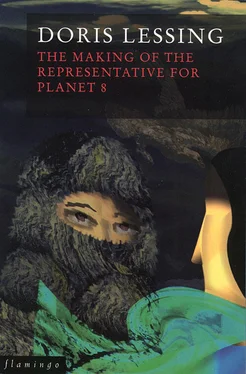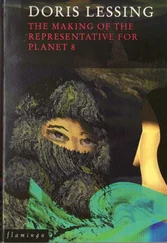After a day on these aromatic pastures, our people were reborn, were their old selves: it was clear that the plants held some vital and powerful principle for health. Klin sent messages to Bratch, who was the Representative for Health, and he came, and sent for his helpers, and soon this plant, which grew again as quickly as it was cut, had made quantities of a kind of hay, that was more dried flowers than foliage, and then – it was a question of deciding how to apportion the life-giving food, for there was not enough of it to provide our people with even a mouthful each.
Who was to be benefited? On what basis was it to be decided?
Klin and Marl and Masson and Pedug and Bratch, standing around inside the shed, telling us all this, were restless; wanted, we could see, not to be there, had in their minds the sight of the fair brief world of the polar summer which they had reluctantly left to confer with me, with other Representatives in the area – and with Johor. But I could see they scarcely looked at him, their eyes seemed to move over and away from him. And this was not only because they had not before seen him so clearly as a being like ourselves, suffering and pallid inside a caul of beast’s skin, but because they did not expect anything from him. Yet no one had said to them: ‘This planet will not be saved, the promises made to us are without a future.’ Before, it was to have been expected that everyone would come up to Johor, saying: ‘Canopus, where are your fleets of Space Travellers, when will you take us all away?’ But no one said this. And Johor stayed quietly sitting on a heap of sacks filled with furze.
‘Why stay here, in this dying place,’ said Marl, ‘even for as long as we need to confer – come, we will go down to the summer, and we can make our decisions there.’
And so we, Johor and I, and all of them, and ten of the other Representatives, pushed our way through the snows around our town, and then stumbled and slid down hillsides, and mountain passes where we believed we would die of the cold, and down again to where ahead of us we could see blue, only blue – blue skies and blue earth – and a keen wind brought to us not the sharpness of cold but warm balmy smells that we had forgotten. And my eyes seemed to be swelling and growing, as they fed on the colours for which they were starved … And yet, even as I stumbled towards the blue and lovely summer ahead, I was saying to myself, I, a smear or haze of particles on which light shines, I, a nothing, a conglomerate of vast spaces defined by a dance my mind cannot comprehend, am running forward into – nothing, for if I saw this summer land as Johor does, with his Canopus eyes, I would see a universe of space in which faint shapes drift and form and dissolve – I, nothing, run forward towards nothing, weeping as I run – and where live the emotions that make these tears, Johor? Where in the great spaces in the faint mist that I am, where in the fluid flowing structure of the dance of atoms, where … and how … and what, Johor?
When we reached the hillsides where green showed under the bushes laden with blue flowers, we flung ourselves down and rolled and, seated above the summer with the snow peaks and half-frozen lands at our backs, looking into a sunlight where drifted cloud shadows and sudden chills and reminders of the winter that would soon come down again over this scented miracle, we talked about what we must do, what we had to do.
We talked. Johor did not, though he sat among us as if he was one of the conferring group.
Our problem was practical: when we had decided who was to benefit from this food, how was it to be conveyed? Movement between villages and towns had ceased, except for teams who dragged in the supplies of dried meat. How were we to carry loads of this light but bulky stuff up into the snow and the ice, and, when it was distributed, were they to cook and eat it, or eat it as it was – for all of us were eating the flowers straight off the bushes without ill-effects, apart from the mild stomach disorders which we had to put up with as an aspect of what we had to expect now. At last Bratch suggested that we should pile the dried plant into the ponds and the water holes, hoping that the enlivening principle in it would be transferred to the water. Some of the water could be carried in containers up into the snow-covered lands, but soon the bogs and marshes would freeze again as the cold came back and we could send down teams with sledges to transport this ice, or even to drag up chunks of it across the snow. And, meanwhile, send messengers everywhere to say that this shallow summer was here, providing vegetable matter for those who could or would make the effort to come and enjoy it.
Some of those who were making the living fence to keep the herds off the part of the harvest we had allocated for the use of our peoples went off to make sure the news reached all the populated centres. As for us, we stayed where we were, using every hour of daylight to pile the hay into the bogs and fens. The weather was not hot enough to make fermentation an immediate problem. The earth-smelling waters of these moorlands soon were emitting the fragrance of the plant, and our nights were spent lying out among the living plants, mostly awake, for we knew that this time of reprieve would soon end. The stars shone down, but not with the hard cold brilliance in blackness of the nights of the expedition up to the other pole: this was a distant mild shining, and they were continually going out as mists and veils blew across our skies.
By the time the messengers had come back, the plants had ceased to spring up again as they were cut; shadow lay more often on the hills and valleys than sun did; and the winds were not balmy, but made us shelter inside our deep coats. And the herds were no longer rearing and charging about, or bellowing, but were silent again. We all of us went to a place where we could look down on a valley crammed with these beasts, who stood with lowered heads above earth where there was no longer any green, or blue, or the soft blowing movement of growing things. We looked at a bull standing close to us, with the group of females that he served, and the calves of that season – there had been very few calves born for many seasons. We saw in the disconsolate, discouraged set of his shoulders that he felt himself a failure – lacking – hurt; for once again he would be commanding a group perpetually hungry, not able to breed, since nature was saying no, there is no future; once again they would have to lower their soft muzzles to the dense earth that is half-vegetable, forcing the unliked stuff into their stomachs that only partially digested it. And the females were anxious to keep their calves near them, and their eyes were red and wild, and they licked and maintained these small replicas of themselves with a desperation that said everything of the emotions that filled them. From horizon to horizon, the herds stood there – waiting. And we, too, now would have to return to our waiting.
There were about forty of us Representatives on that slope above the herds, and a hundred or so of those who had taken the messages to the people. Some people were coming in, in small groups, to take their share of the harvest, which was so sparse now, and they too rolled around in the green and ate the flowers. But only a few had been able to rouse themselves from their torpor and make the journey. We stood, a small multitude, in a hollow between low hills.
Long before those times of The Ice, I had learned to watch the disposition of people, events, what is said and what is not said – so as to understand what was likely to happen – what was already happening, but not yet fully disclosed. Those crowds standing about there, again huddling into the thick skins, watching the skies, where the first snow clouds were massing, were not differentiated in any way, and Johor stood among them, almost unnoticed, though everyone knew that Canopus was among us. Soon we Representatives moved out of the mass of people and up on to a slope. It was because this was expected of us; we could see, feel, sense, that we should do this. But Johor stayed where he was.
Читать дальше












